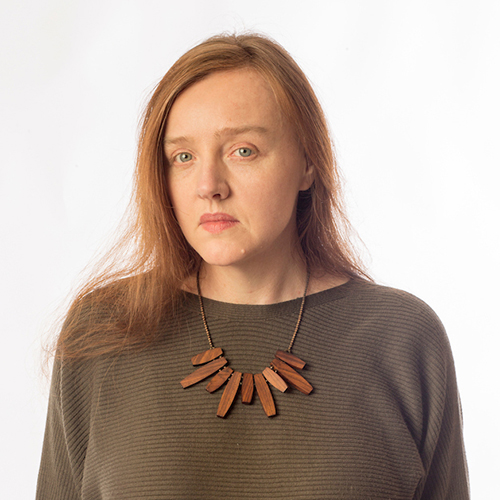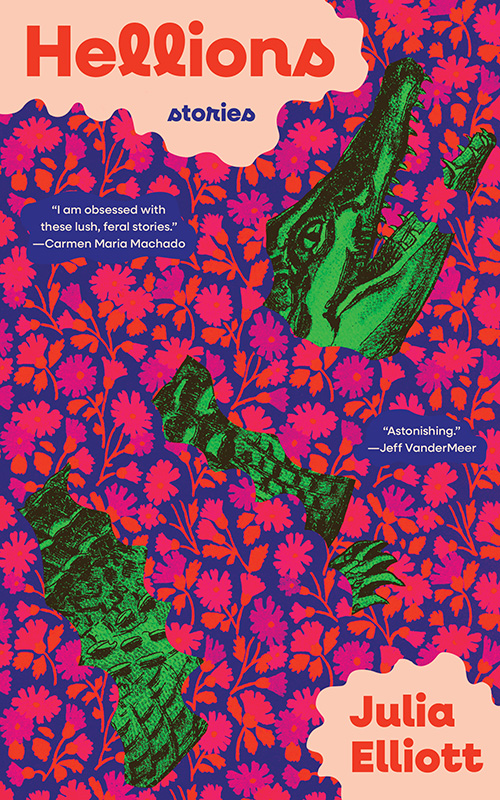Shapeshifting cryptid creatures lurk in curious places throughout Julia Elliott’s new book, Hellions. You can find them hovering over trampolines, skulking through Lowcountry wetlands, even fur-clad and hunting for game in a time-travel dating app. Elliott molds and shapes her mythical beings like a possessed potter working with clay. It might come as a surprise to her fans to learn that, as an undergraduate, she minored in art with a focus on ceramics.

Elliott, professor of women’s and gender studies and English in the Palmetto College and Honors College at the University of South Carolina, often fashions from her imaginative gray matter strong female protagonists who harness their power in unusual ways. Even in real life, women must bend and adapt to fit into the many roles society demands of them. That flexibility is kind of a superpower, especially when combined with the mythical and macabre in Elliott’s stories. Her strong female characters, even though fictional, empower students with new perspective in studies that focus on feminist culture.
Since its release this spring, the book has received wide praise and been included on best summer book lists by editors of Time magazine, Publishers Weekly, The Washington Post and more. The New York Times Book Review hailed the book this way: "Swamp apes and Slim Jims populate the rural landscape of this collection, which swings from comedy to horror in stories about pet alligators, shape-shifting professors and more."
Elliott's choice of title was both deliberate and precise.
“Hellion is a word I heard often while growing up in rural South Carolina,” she explains. “A hellion is a rebellious, impish creature that sometimes causes all hell to break loose. While many of these stories explore the uncanniness of girlhood, others tap into the archetypal potency of those beings who lurk along the borders between the real and surreal. … This is very intentionally a book about female hellions. I gravitate toward female characters. It’s a unifying concept.”
Elliott’s formative years were shaped by her father’s affable storytelling and lots of books, as well as an enduring fascination with the legendary 1970s horror movie, The Exorcist. In fact, the title story in Hellions was inspired by one of her father’s true stories from childhood about a pet alligator. Her unfiltered prose of today launches spellbinding adventures into surrealism, oddities, witchcraft, horror, medieval folklore and the occult.
It started with poetry
In high school, Elliott attended the South Carolina Governor’s School for the Arts, where she began writing poetry. “It was a great way to start because it made me think about language in a serious way,” she says. “In college, I switched to fiction.”
She published her first story collection, The Wilds, in 2014, followed by a novel The New and Improved Romie Futch in 2015, both to wide literary acclaim.
At USC, Elliott teaches courses on topics that include feminist theory, women in culture, fiction, American literature and an immersive Honors course titled Monstrous Mothers and Femme Fatales: Gender and Monstrosity in Horror Films, during which her students get to promote and develop content for an annual horror film series in Columbia. All the while, students observe how women are depicted in horror films and what it might suggest about history, gender and culture.

Research plays a primary role in much of Elliott’s fiction.
“I read a lot of medieval literature. I am interested in the medieval female mystics,” she says. The research lends her stories authenticity while educating at the same time. The first story in Hellions, titled "Bride," is set in an ancient nunnery, where the nuns live in desperate poverty, habitually flog themselves … and drink beer daily.
“Drinking beer was pretty common back then, especially if you were nutritionally deprived,” she explains. (Heavily grain-enriched beer was a necessary part of the Medieval diet, like bread.) “It was interesting because some people in that period drank alcohol all day and didn’t have caffeine. That is historically accurate.”
Elliott’s gift with language that pulls the reader in is evident, like this introduction to "Bride":
Wilda whips herself with a clump of blackberry brambles.
She can feel cold from the stone floor
pulsing up into her cowl, chastising her animal body.
She smiles. Each morning she thinks of a new penance.
In another Hellions story, titled "Moon Witch, Moon Witch," the female character meets and engages with potential romantic interests at different times in history through a virtual reality dating app. In a virtual prehistoric setting, the woman is a shaman-like tribalistic leader. Many women in a prehistoric subsistence culture, Elliott found, in fact participated in game hunts.
“In my research, I found that more and more women hunted right along with men,” she says. “We have mythologized the great male hunters.” In an uncanny twist, the woman is “not brave enough to meet the man in real life. It’s a Victorian situation.”
To be transported
Of her literary influences, Elliott says it is difficult to choose favorites. A few names that come to mind include Octavia Butler, Gabriel Garcia Márquez, Shirley Jackson, Franz Kafka Margaret Atwood and George Saunders. Ultimately, her goal is, like them, to take the reader to another space.
“I really want readers to feel transported. What I love when I am reading is to be transported by language that takes me to another place. That is how I feel when I read writers that I like,” she says. “If you are not charged up with someone else’s language, you can’t summon that language for yourself.”
Hellions is dedicated to Elliott’s precocious 13-year-old daughter, Eva, who is developing as a fine young writer herself.
“She reads a lot, including books for adults, not just ‘young adults.’ She has a very elaborate style, sometime satirical. I feel like she is way more talented than I am. She has a whole reading life that I don’t fully understand.”
My guilty pleasure is reading something from a disreputable press that I would never use in academia.
Despite her intriguing penchant for the absurd and horrific, the poker-faced professor admits to one thing that truly terrifies her.
“As an instructor, the main thing that horrifies me is when I get something turned in that is obviously, predominantly AI-generated. It’s concerning the way AI has penetrated academia,” she says, adding that, as a result, AI is necessitating changes to curricula, including assigning more projects to be written in class.
Guilty pleasures
So what guilty reading pleasures does such an accomplished literary voice take to the beach?
“My guilty pleasure is reading about psychedelics and witches,” Elliott says, “something from a disreputable press that I would never use in academia.”
Her fans and students undoubtedly are eager to see what Elliott throws on the potter’s wheel next.
The author told the Post and Courier earlier this year: “My current novel in progress, Frog, is a sci-fi retelling of The Princess and the Frog, which also began as a short story, albeit one that had no science fiction elements and was more firmly planted in the misty realm of fairy tales.”